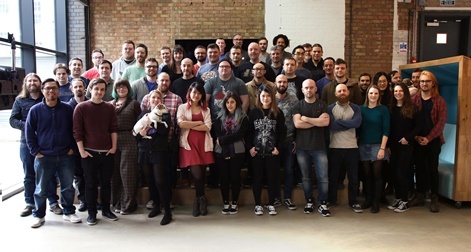The games industry plays host to an excellent cast of colourful and diverse individuals, from artists and coders to narrative designers and studio heads.
The skills to pull off these roles, however, are complex and differing. With each position requiring mastery in its field.
As such, seeing a game come together is a beautiful thing akin to a puzzle as an overall picture becomes whole.
To highlight some of the brilliant work that goes on behind the screen, and help others who may be keen to dive in, PocketGamer.biz has decided to reach out to the individuals who make up the games industry with our Jobs in Games series.
This time we caught up with Hutch head of QA and customer support Matthew Pelly.
PocketGamer.biz: Can you tell us about your current role and what it entails?
Matthew Pelly: I am the Head of QA and Customer Support at Hutch and also the producer for our tools and tech development team.
My role has changed a lot over the years. It used to involve being very hands-on with testing and customer support - I was the sole QA/CS for a long time.
But as we have grown and established teams in each of those disciplines, I now focus on the long-term direction of those departments, developing team members, and on the QA side; collaborating with the team to establish test strategies.
A lot of the job now is basically making sure we are all learning from each other, carrying over best practices and providing a philosophy to guide decision making throughout the team.
How did you first get into games and how did you progress into this role?
I got into games accidentally. I had just finished university and was wondering what to do with myself. I was halfway through applying for a Rural Estate Management course at an agricultural college when I saw a temporary games testing job advertised at EA. What started as a three-month contract has turned into a 13-year career.
That first contract was as a black box tester in a test centre, in a building completely separate to the main development offices. Mid-way through my first project, Burnout Dominator, I was fortunate enough to be selected to go and work in the studio as an embedded tester.
I immediately saw how much easier the job was once you could talk directly to the developers and see how everything was built and managed to stay embedded in that studio (Bright Light) for the next few years - working my way up to test lead and then senior test lead.
During that period, I was fortunate enough to be loaned out to various other EA studios / EA Partners, such as Crytek, DICE and Criterion. This meant I was able to learn how multiple studios worked and the pros and cons of each working environment.
Games degrees weren’t a thing when I went to university, certainly not to the extent they are today so it wasn’t an obvious career path.Matthew Pelly
Unfortunately, Bright Light was shut down so I moved within the company to Playfish and was hired as a project lead working across all projects to organise the testing for any tech changes or platform compliance that affected all games. It was also a great opportunity to learn all about free-to-play and Agile.
When Playfish was closed I was contacted by Hutch, which was just starting out, and joined there as the QA / customer support / community manager. There were no other testers and no testing process so it was very much starting from scratch and mostly relying on outsourcing the bulk of the testing as there was much too much for one person.
The customer support / community management side of it made sense as it gave me a 360-degree view of the game and allowed me to quickly understand what was important to the players and to feed those issues back to the development team
Over the last five years as the company has grown, and we work on more products simultaneously, I have returned to the cross-project view that I was familiar with at Playfish.
As we begin to solve many of those early challenges and growing pains my role has expanded somewhat into production, enabling me to get my teeth into different types of problems.
Is it something you ever imagined yourself doing?
Not at all. For the first couple of years, my parents were asking me when I was going to get a real job! Games degrees weren’t a thing when I went to university, certainly not to the extent they are today so it wasn’t an obvious career path.

I have always been into games and enjoy the problem-solving aspect so it has turned out to be a good fit for me. I do wonder sometimes what life would have been like if I had started that rural estate management course.
What did you study (if anything) to get your role? What courses would you advise for aspiring professionals in the area?
I actually studied Geography at university which is not particularly relevant to the role, but university did teach me a lot about how to present work in an effective way, time management and really paying attention to detail.
I think people from a variety of backgrounds can succeed in QA. Much of the QA role is about representing the view of the player and in mobile we have so many different types of players playing in different ways.
Those from design backgrounds have a great understanding of the user experience, those from computer science backgrounds can really grasp the inner workings and are able to more effectively pair test with developers, and those without degrees are just as likely to succeed if they have an inquisitive, analytical mind and can work well in a team.
We are not here to rubber stamp releases and it is a fatal mistake to step into that role.Matthew Pelly
I am a strong believer that QA should have a really good understanding of Agile. It is very much in QA’s (and customer support’s) interest that things go smoothly and that features are as free from bugs as possible.
Much of that is down to the development process and by having a really good grasp of Agile, it is easier to influence that process as you can clearly explain the benefits.
Other than that, just an absolute hunger to learn. Join testing societies, read ebooks, attend conferences if you can. Soak it up.
What part of your role do you find most fulfilling?
The cliche answer here would be to ship a bug-free product but we all know that bug-free isn’t reality.
What I actually find most fulfilling is observing the close collaboration between development and QA. QA is involved at every step and that has come from consistently demonstrating the value of that early communication.
Bug prevention is very much our focus and you can cut out the vast majority of possible bugs by focusing on that collaboration; particularly with three amigos, pair testing and sharing our test plans as mind maps.
Essentially, get everyone on the same page and everything goes much smoother.
Do you think there are any misconceptions, public or professional, surrounding your area of expertise?
I don’t think people really understand what QA does. Particularly when they have worked in companies where work is chucked over the wall to a faceless QA department in another part of the building.

There can also be the misconception that anyone can be a good tester. There is a big difference between playing games and testing games. It is actually a really difficult job.
You need to have an understanding of the entire product as a whole (economy, metagame, user experience, scope, schedule), right down to the granular level of exactly how each feature works in pretty much every possible permutation - not necessarily to test all of it, but at least be able to analyse the risk involved with each.
QA generally is the only team with this unique view of the game and often then act as subject matter experts for game functionality. It is a real all-rounder role; creative, strategic and technical in equal measure.
I think these misconceptions are put to rest once the team has worked closely with embedded QA and have seen how they work and their contribution to the project throughout its entire lifecycle.
There can sometimes be the perception, both public and professional, that QA is responsible for the quality of the game - the title of quality assurance admittedly doesn’t help with that.
I think a fair few people have said the same thing, but I wish I had known that crunch was not the norm.Matthew Pelly
Quality is the responsibility of the whole team, QA simply helps the team to build a quality product by encouraging error prevention, and by assessing and advising on risk throughout development.
Testing informs us of that risk, both as known issues and the unknowns - where sufficient test coverage hasn’t been possible in the given time. We are not here to rubber stamp releases and it is a fatal mistake to step into that role.
Is there anything about the job/industry you wish you would have known when first joining?
I think a fair few people have said the same thing, but I wish I had known that crunch was not the norm. My first few years in the industry were spent working long hours (and eating lots of pizza).
I didn’t mind too much when I was young, free and single (and getting paid overtime) but it is not a life I would like to return to, and I would love to have some of those evenings and weekends back.
I am glad that Hutch recognises that it is not a healthy way to work and that many other companies are now turning their back on the crunch culture.
What other advice do you have for someone looking for a job in this profession?
Have a genuine desire to build a career in QA. Many candidates want to be designers or producers or whatever.
Those are fine aspirations to have as QA can be a foot in the door for a lot of people and those who do jump into other disciplines are usually better off for it - as that time spent in QA gives them more of a holistic view of the process.
That said, it is really refreshing to get an applicant who wants to learn the craft and focus on QA, and actually, those who do will find they can progress quite quickly.
Read up on testing methods and learn all about Agile. You may not have the experience yet, but if you have a base understanding of how things should work then you will have a head start.
I would also advise that they focus on applying to studios directly and avoiding black box test centres. It is easy to become trapped at that level unless there are opportunities to work on site - in which case jump at them, wherever they are!





















